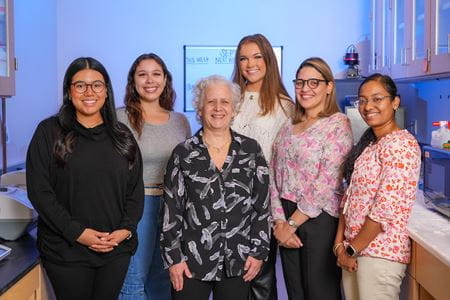Lilian Plotkin’s research laboratory at the Indiana University School of Medicine includes budding scientists as young as high school, up to early career PhDs. Most of those scientists are women. Many, like Plotkin, are Spanish speakers with South American roots. Rounding out her current international team is a technician from India and an undergraduate researcher from Russia. Plotkin, PhD, an Argentinian trained scientist, patiently and skillfully leads them as they delve into the mysteries of bone biology.
“She's not just a great researcher and PI (principal investigator), she is also an excellent teacher and mentor — and an even more amazing human being altogether,” said Paola Ortiz Gonzalez, a student in the biomedical sciences PhD training program at IU School of Medicine. “As a Puerto Rican far away from my home country, she makes this place feel like a home away from home.”
Plotkin, a professor of anatomy, cell biology and physiology and director of the histology and histomorphometry core for the Indiana Center for Musculoskeletal Health at IU School of Medicine, was named the first recipient of the Inclusive Research Laboratory Award instituted by Faculty Affairs and Professional Development at IU School of Medicine. She received a dozen nominations from lab members past and present.
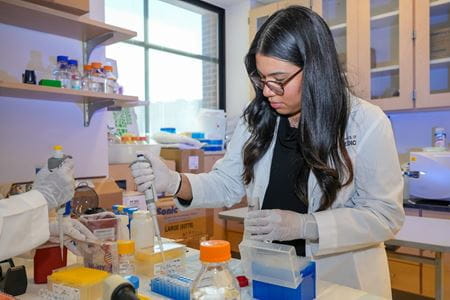 “I have been privileged to witness the transformative impact of the culture created in her lab,” said Tara Hobson, PhD, director of faculty development at IU School of Medicine and Plotkin’s colleague in the Department of Anatomy, Cell Biology and Physiology. In a previous role with the Graduate Division, Hobson frequently visited Plotkin’s lab to check on student researchers. “Whether it was sharing cultural treats, celebrating identities, or inviting me to meet the lab's newest member, Lilian always seemed to recognize and celebrate everything about the lab's people, not just their science.”
“I have been privileged to witness the transformative impact of the culture created in her lab,” said Tara Hobson, PhD, director of faculty development at IU School of Medicine and Plotkin’s colleague in the Department of Anatomy, Cell Biology and Physiology. In a previous role with the Graduate Division, Hobson frequently visited Plotkin’s lab to check on student researchers. “Whether it was sharing cultural treats, celebrating identities, or inviting me to meet the lab's newest member, Lilian always seemed to recognize and celebrate everything about the lab's people, not just their science.”
Trainees in the Plotkin Lab say their confidence is boosted by the way their mentor values everyone’s opinions — even the least experienced among them. Lab meetings are often augmented with homemade snacks from various cultures, making them feel more like a family gathering. Plotkin also hosts seminars with colleagues from around the globe, exposing her young team to international connections and collaborations.
“Dr. Plotkin ensures that everyone feels their input is valued by creating an environment where different perspectives are not only welcomed but considered essential for the lab's success,” Ortiz Gonzales wrote in her nomination. “Conversations and debates within the lab benefit from a wide range of viewpoints, resulting in more robust and creative scientific exploration.”
Developing next-gen bone scientists
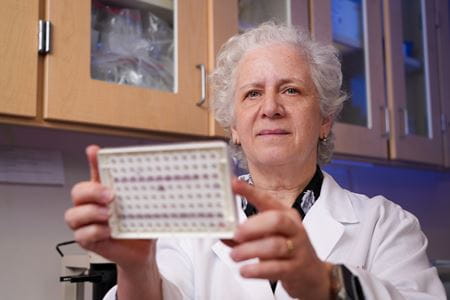 Growing up Buenos Aires, Plotkin engaged in conversations about science and medicine around the family dinner table. Her father is a nuclear medicine physician who worked in cancer detection and treatment.
Growing up Buenos Aires, Plotkin engaged in conversations about science and medicine around the family dinner table. Her father is a nuclear medicine physician who worked in cancer detection and treatment.
“I’ve always been curious,” Plotkin said. “I want to know how things work.”
After volunteering with her father in the hospital, Plotkin realized that path wasn’t for her. She credits her brother, a physician scientist working in drug development, for getting her into bone science. He finished his medical degree the same year Plotkin completed her biochemistry degree at the University of Buenos Aires, where she later received a PhD in immunology. After her brother moved to the U.S. to work in a research lab studying pediatric bone diseases, the siblings decided to collaborate on a project. Plotkin soon came to the U.S. as a postdoctoral researcher at the University of Arkansas in a laboratory studying bone biology and its relationship to the immune system.
Plotkin joined the faculty at IU in 2008 and is now an NIH-funded researcher and fellow of the American Society for Bone and Mineral Research whose work has been published in several high-impact journals. In 2023, she received the society’s Paula Stern Achievement Award, an honor recognizing a woman in the bone research field who has made significant scientific achievements while promoting the professional development of other women.
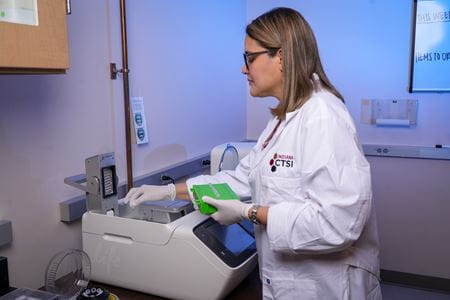 Postdoctoral fellow Roquelina Pianeta, DDS, PhD, said she feels grateful for the opportunity to work in Plotkin’s lab since she had no prior experience with musculoskeletal research or animal models.
Postdoctoral fellow Roquelina Pianeta, DDS, PhD, said she feels grateful for the opportunity to work in Plotkin’s lab since she had no prior experience with musculoskeletal research or animal models.
“Being born and raised as a woman in a country like Colombia limits one's opportunities to advance, which is why it was an immense emotion for me that she accepted me,” Pianeta wrote in her award nomination for Plotkin. “Once I arrived, I did not find a boss. I met a mentor who always ensures I am doing well and improving in every way.”
Not only does Plotkin invest in the development of female scientists, but her research itself reflects a commitment to equity. In studying a protein and related molecule important to the protection of bone cells and prevention of osteoporosis, Plotkin’s team noticed something interesting.
“We found that males and females in our animal models were having different results,” she said. “From then on, my main interest became trying to understand why. We’re doing molecular studies and looking at this cellular differentiation and activity.”
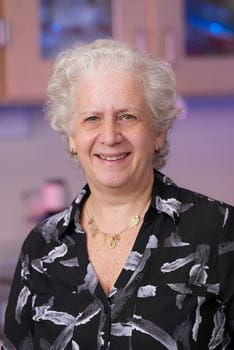 Historically, most medical research studies have been done on men, often to the detriment of women who may exhibit different symptoms for the same disease or respond differently to treatment, Plotkin said. Her lab continues to tease out the contributions of sex hormones in animal models, and she advocates for inclusivity in scientific study design.
Historically, most medical research studies have been done on men, often to the detriment of women who may exhibit different symptoms for the same disease or respond differently to treatment, Plotkin said. Her lab continues to tease out the contributions of sex hormones in animal models, and she advocates for inclusivity in scientific study design.
Although Plotkin’s lab is predominantly female, she has also mentored several men in musculoskeletal science. Among the nominators for her recent award were male scientists who self-identified as first-gen, gay, Latine, Mexican American and Black — each noting the supportive environment and opportunities Plotkin facilitated for their professional growth.
“She fosters a very inclusive, diverse and healthy lab environment and is a very wise woman,” Ortiz Gonzalez said. “She is one of those mentors that just fosters the love of science in you, as well as love for life.”
